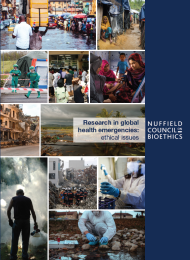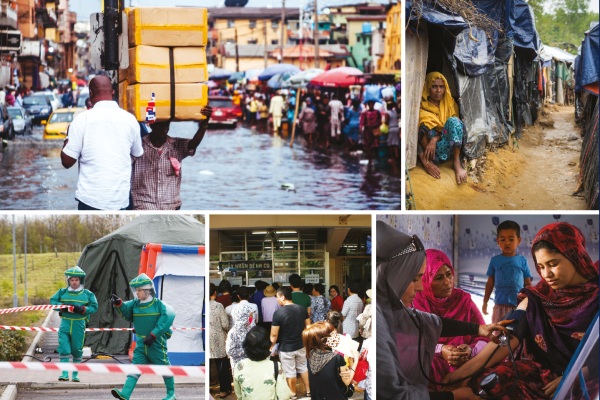Research in global health emergencies: ethical issues
Report
Published 28/01/2020

Ethical issues faced by front-line workers
See Chapter 10 of the full report
People working on the front-line of research in global health emergencies can face particularly challenging, often dangerous, working conditions. There is an increasing awareness of the need to support front-line workers better in dealing with ethical challenges that emerge during their involvement with a study.
Welfare and fair treatment of front-line workers
The role of front-line workers may be inherently risky, and there can be a tension between respect for the welfare of research workers, and effective conduct of the planned research. Funders, employers, and research ethics committees all have a duty to consider the welfare of workers, alongside the welfare of participants and the value of the research, and to ensure action is taken to mitigate foreseeable risks. Local knowledge will be crucial in recognising such risks, and in identifying how to prevent or mitigate them.
Differential terms of employment between local and international workers, or between different staff groups (such as those with or without professional qualifications), can be exploitative. They are a source of concern to many in the field, and may undermine scope for respectful collaboration. While the value of ‘equal respect’ underpins equality of treatment, how this is realised in practice is not straightforward. In lower-income settings it can create other sources of inequality – for example, paying all workers international rates could seriously undermine local health systems and economies.
We recommend:
Employers should be completely transparent about the basis for any differential treatment of local and international workers, and have an inclusive approach, involving domestic ministries of health for example, in determining relevant terms and conditions. For some aspects of employment, such as responsibility for personal security, it is hard to see how any differential treatment could be justified.
Ethical support for front-line workers
While careful review processes and collaborative work with local communities to understand local needs and sensitivities can play a part in reducing ethical dilemmas facing front-line workers, such dilemmas are still an inevitable part of working in an emergency.
We recommend:
• People working on the front-line (who are often the least well-supported) need to have access to timely, high quality ethics support in a variety of forms.
• There is also a need for a flexible platform to provide timely ethics advice and support for those involved in all aspects of research in emergencies, including those funding, planning, and carrying out research. We welcome the launch by WHO of the Public Health Emergency Ethics Preparedness and Response (PHEEPR) Network.
Example from Lebanon of ethical support for workers
Support for workers involved in mental health studies with Syrian refugee children included:
- providing training for workers on ethical research practices;
- creating space to raise ethical issues, including through regular debriefs and clinical supervision;
- establishing clear lines of responsibility for making difficult decisions on the ground;
- adapting study designs in consultation with local experts and Syrian refugees, thereby reducing risks of insensitive design; and
- prioritising worker safety over data collection.
Credit:
Queen Mary University of London
IDRAAC / St George Hospital University Medical Center
Médecins du Monde (France)
American University of Beirut

Share